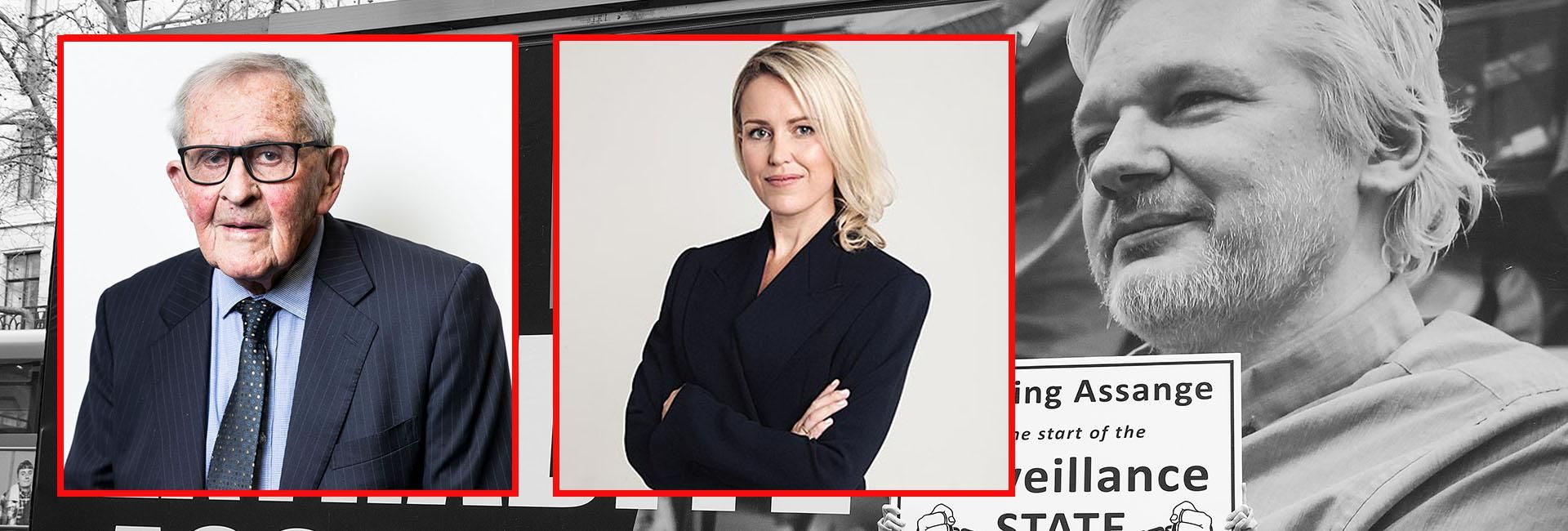She is a young warrior for human rights and free speech on the world stage. He is a pioneering allay of Indigenous legal advocacy in NSW. What surprised Jennifer Robinson was how closely their paths, 58 years apart, were intertwined in their roots and motivating passions.
The 40-year-old Robinson, a barrister at London's Doughty Street Chambers is best known for defending Julian Assange and WikiLeaks but has also worked tirelessly to support the West Papuan independence movement. Professor Hal Wootten, the founding dean of UNSW's School of Law and Justice, served as a NSW Supreme Court judge, worked with the nascent Papua New Guinea state, initiated the formation of the NSW Aboriginal Legal Service and jointly presided over the Royal Commission into Aboriginal Deaths in Custody. He also sat on the Native Titles Tribunal and the Australian Law Reform Commission.
When Robinson received a personal invitation from Wootten earlier this year to give the annual Hal Wootten Lecture at UNSW Law and Justice, it was his reputation that made her say yes. Wootten, who shared Robinson's passion for human rights law, said he was motivated to issue the invitation after watching a profile of Robinson on the ABC's "Australian Story". Sadly, Wootten died on July 27, 2021, at 98, before the two could meet in person.
In response to his passing, Robinson used the 2021 Hal Wootten Lecture to reflect on the UNSW founding dean of law's formidable legacy. "Hal's was a life lived greatly in the law and we all stand greatly on his shoulders," she said. "Hal encouraged law students about the possibility of living greatly in the law, that is, living and working with a passion for justice and ensuring the law serves those most in need."
Robinson best known for her long-standing legal representation of Assange, is passionate in her desire to rectify human rights, in the Assange case, it is "the principle of protecting press freedom and freedom of speech."
The law is often seen as a profession born of privilege. Wootten and Robinson bucked that trend, both coming from humbler beginnings in country New South Wales. Robinson's family trained race horses at Berry on the NSW South Coast; Wootten grew up on a dairy farm near Tweed Heads on the NSW-Queensland border. That country connection proved to be the first of many similarities, Robinson saw as she reviewed their life journeys.
'The law in this country has been used as a tool of colonisation and oppression.'
They both made journeys to Melanesia – Wootten to Papua New Guinea and Robinson to West Papua – early in their careers. Time spent in the region led both to rethink colonisation and injustice in their work in Australia.
"Hal once said and I quote 'I always felt it was strange that here I was so bound up with New Guinea but I didn't even know the Indigenous people of my own country and that was nagging at the back of my mind.' It was nagging at the back of my mind too," Robinson said.
Just like Wooten many decades earlier, Robinson realised that she could make a stronger difference in West Papua by returning home and becoming a lawyer. Human rights became the driving force for the work that both would pursue in their careers.
"I could do more for West Papua by coming home and becoming a lawyer. West Papua helped me find my passion for the law."
Robinson's passion for Indigenous rights in Australia grew as she began to recognise how the land that she grew up on and the education that she received, pointed only to the colonial undertones of Australia's history.
"The law in this country has been used as a tool of colonisation and oppression," she said. "I grew up in Dharawal, Jerrinja and Yuin country but I wasn't taught this at school. I've realised that I've grown up in a country that I haven't been educated to understand."
"Listening to Indonesians speak about West Papuans, I heard the same racism that I had grown up around. It was just in a different geographical and cultural context," she said.
As lawyers, both Wootten and Robinson were motivated by the principle of having an impact on society, rather than on how much money they could stash into their bank accounts. Robinson says it is through the work of people such as Wootten that young lawyers can learn what having a career in law should look like.
"I can say with confidence that I am where I am today because I make decisions based on the impact that I can have and what I can learn, not on what I can earn and, as Hal said, 'a comfortable income was a by-product of my practice, not its purpose'."
After reading Wootten's 2008 essay "Living in the Law" dictating the life and values that he had held in his career, Robinson began to see the similarities between their stories and felt personally touched by Wooten's invitation.
"I was told that Hal had wanted to invite me because he said those values were reflected in my career. This was one of the most meaningful compliments that I have ever received," she said. "I can only hope that in the decades ahead, I can make a fraction of the contribution he did. But imagine what we can achieve if we all aim for that."
Laura is an undergraduate Media (Communications/Journalism) student with a passion for current affairs. In her spare time, you'll find her on a stroll along the beach with her two cocker spaniels, shopping online or planning her next adventure.






Afraid of an egg: the tyranny of living with social media's body standards